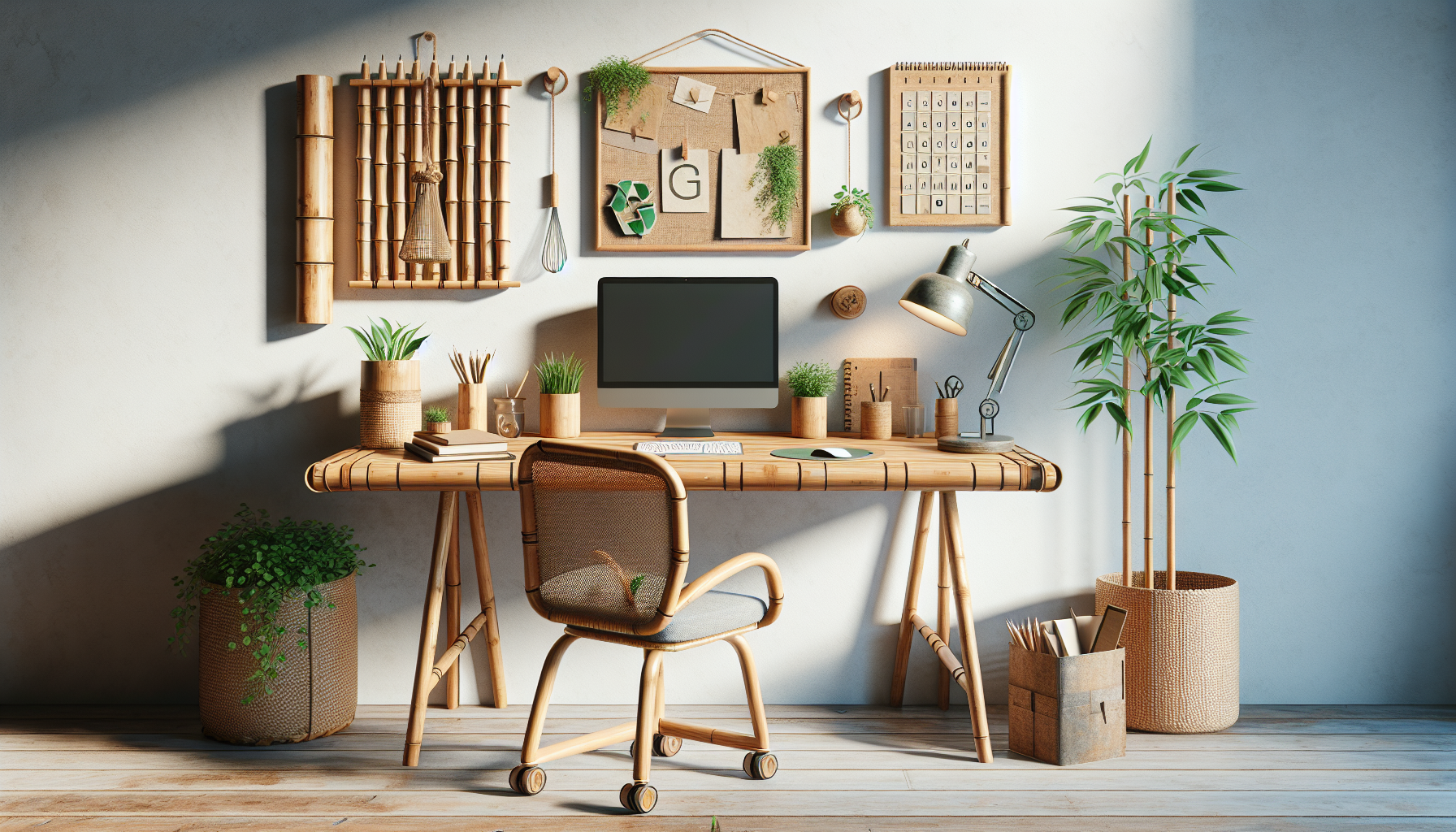Your cart is currently empty!

Eco-Friendly Materials for Sustainable Desk Setups
Eco-friendly materials are transforming how we view sustainable desk setups, offering a compelling blend of functionality and environmental responsibility. These materials, sourced from renewable or recycled origins, aim to minimize ecological impact while maintaining aesthetic appeal. Here, we delve into various options for setting up an eco-conscious workspace.
Bamboo is a leading choice in sustainable furniture. Recognized for its rapid growth, bamboo is a renewable resource that can be harvested in three to five years, compared to decades for hardwood trees. Its durability and light weight make it an exceptional alternative for crafting desks, chairs, and storage units. Bamboo’s natural finish lends a sleek, modern aesthetic to any office space while providing robust support for your work needs.
Recycled metal is another innovative material gaining popularity in desk setups. Metals such as aluminum and steel can be recycled multiple times without degrading their properties, offering a perfect solution for sustainable office furniture. Desks, lamp stands, and shelving units made from recycled metal are not only sturdy but also bring a contemporary, industrial feel to a home office. Opting for recycled metal reduces demand for virgin materials, cutting emissions and conserving raw resources.
Reclaimed wood is also instrumental for sustainable desk spaces. Harvested from old buildings, barns, and discarded furniture, reclaimed wood carries unique character and history, visible through its distinctive grain patterns and coloration. Using reclaimed wood in desks or computer stands reduces the need for new lumber, contributing to forest conservation efforts. Its rustic charm complements various decor styles, promoting a cozy, inviting workspace atmosphere.
Cork is an underutilized yet highly beneficial material for eco-friendly desk setups. Harvested from the bark of cork oak trees without harming them, cork is both renewable and biodegradable. Its versatility is noteworthy—commonly used in bulletin boards and mouse pads, cork can also feature as a desktop surface, offering a soft, natural texture. Cork’s inherent sound-absorbing qualities can enhance the acoustic comfort of your home office, ensuring a quieter work environment.
Recycled plastics are revolutionizing furniture design for environmentally conscious homes. By repurposing post-consumer plastics, manufacturers create durable, resilient desk accessories such as organizers, monitor stands, and chair mats. These products not only help divert waste from landfills but also imbue your workspace with a colorful, modern flair. Choosing items crafted from recycled plastic supports the circular economy, perpetuating a cycle of reuse and regeneration.
Felt made from recycled materials is gaining traction as a sustainable option for desk accessories. Normally crafted from plastic bottles or other post-consumer waste, recycled felt is ideal for office essentials like pen holders, notebook covers, and cable organizers. It offers a soft, tactile experience and can introduce vibrant color palettes into your desk setup, all while being an environmentally friendly choice.
Linoleum, a naturally occurring material, is a prime candidate for eco-conscious desktops or floor coverings. Made from linseed oil, wood flour, and cork dust pressed onto a jute backing, linoleum is fully biodegradable and recyclable. Its resilient surface resists wear and tear, making it suitable for high-use areas. The range of patterns and colors available means that linoleum can seamlessly integrate into diverse design schemes.
Eco-friendly paints and finishes are key to completing a truly sustainable desk space. Conventional paints and finishes often contain volatile organic compounds (VOCs) that emit toxic fumes. Opting for water-based, low-VOC alternatives reduces indoor air pollution, creating a healthier office environment. Whether you’re refreshing the surface of a recycled metal desk or touching up reclaimed wood shelving, eco-friendly finishes ensure your materials maintain both their appearance and sustainability credentials.
Additionally, upcycling is an innovative strategy within sustainable desk setups, promoting the creative reuse of existing items. Repurposing materials like pallet wood for a standing desk or using fabric remnants for chair cushions can breathe new life into otherwise discarded items. Upcycling not only conserves resources but also fosters a personalized workspace brimming with character and uniqueness.
Lastly, integrating plants into your desk setup not only enhances air quality but also introduces living, biodegradable materials into your environment. Choose pots made from sustainable materials such as terracotta or upcycled containers to support the eco-friendly theme. Plants like snake plants or pothos thrive indoors and require minimal care, making them ideal companions for your eco-friendly workspace.
In summary, creating a sustainable desk setup revolves around selecting materials that emphasize renewability, recyclability, and minimal environmental impact. From bamboo and reclaimed wood to recycled metal and plastics, each material contributes to a workspace that not only supports productivity but also promotes environmental stewardship. By incorporating these materials, you pave the way for an office that respects both your work needs and the planet.
by
Tags:
Leave a Reply